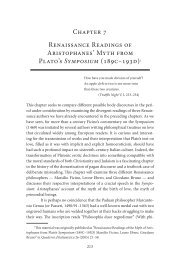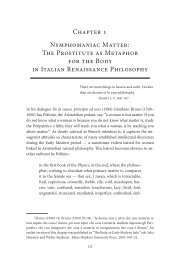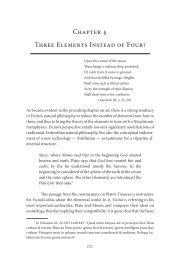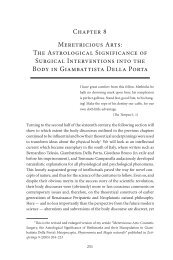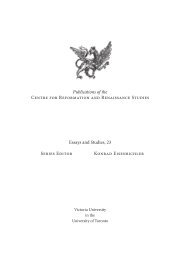Chapter 2 Matter as a Mirror: Marsilio Ficino and Renaissance ...
Chapter 2 Matter as a Mirror: Marsilio Ficino and Renaissance ...
Chapter 2 Matter as a Mirror: Marsilio Ficino and Renaissance ...
You also want an ePaper? Increase the reach of your titles
YUMPU automatically turns print PDFs into web optimized ePapers that Google loves.
<strong>Matter</strong> <strong>as</strong> a <strong>Mirror</strong> 95<br />
The idea that humans themselves not only look into mirrors or skilfully<br />
manipulate them, but can also turn themselves into mirrors becomes<br />
even more obvious in the De amore, where <strong>Ficino</strong> underscores the emotional<br />
<strong>as</strong>pect of this exchange of images. The accomplished lover, again a sort of magus,<br />
must first turn himself into a mirror that reflects the beloved, whereupon<br />
the latter acknowledges his own beauty in the person opposite. <strong>Ficino</strong> maintains<br />
that, ultimately, one falls in love with a person in whom one recognizes<br />
one’s own image; the beloved becomes a magical, living mirror, the object<br />
of desire to which the lover eventually falls prey, converting himself from<br />
agent into p<strong>as</strong>sive subject. 148 The idea that a person could <strong>as</strong>sume the form<br />
of a mirror is also encountered later, perhaps most prominently, in Shakespeare’s<br />
Winter’s Tale when Polixenes says: “Good Camillo, Your changed<br />
complexions are to me a mirror, which shows me mine, too.” (I, 2, 380–2)<br />
Ultimately, these words relate to a p<strong>as</strong>sage in Plato’s Phaedrus (253D–255D)<br />
<strong>as</strong> well <strong>as</strong> to Aristotle’s concept of friendship, which is valuable because it<br />
imparts self-consciousness by acknowledging the friend <strong>as</strong> alter ego. 149 The<br />
idea that the friend serves <strong>as</strong> the mirror image for the self is in accordance<br />
with the broader Aristotelian concept that “in both sensation <strong>and</strong> thought,<br />
in different ways, knowledge involves an identity of some kind of the knower<br />
with the object known.” 150<br />
So why did the concept of mirrors which embody the images they<br />
reflect become so attractive to <strong>Ficino</strong>? The idea is absent in Plotinus, who<br />
is all too keen to ward off the idea that mirrors may have the capacity to<br />
retain images, because to him matter is — paradoxically — “a receptacle that<br />
148 The idea that the lover is actually transformed into the beloved object h<strong>as</strong> interesting<br />
consequences, especially if applied to God himself: does the supreme creator actually<br />
want to be transformed into his creation? Leone Ebreo <strong>and</strong>, to a much greater extent,<br />
Giordano Bruno would later address this question.<br />
149 On this, see Aristotle, Nicomachean Ethics 1170b 6–8; Eudemian Ethics 1244b<br />
24–26, Magna moralia 1313a; Frontisi-Ducroix (1998) 122–123; Kenny (1978) 229; Kenny<br />
(1992) 46–48. To my knowledge, the relationship between <strong>Ficino</strong>’s ide<strong>as</strong> about friendship<br />
<strong>and</strong> Aristotle’s Eudemian ethics, with its Platonic undertone, h<strong>as</strong> never been investigated;<br />
the concept of the will to knowledge, which is inextricably linked to Aristotle’s theory of<br />
friendship, is particularly f<strong>as</strong>cinating. Kenny (1992) 50 summarises Aristotle’s complex<br />
argument in the Eudemian Ethics 1245a 5–10 <strong>as</strong> follows: “We wish to go on living because<br />
we wish to go on knowing; <strong>and</strong> that amounts to wishing that one should be in some sense<br />
identical with the object of knowledge.”<br />
150 Kenny (1992) 50, commenting on De anima; 418a 13–16.



